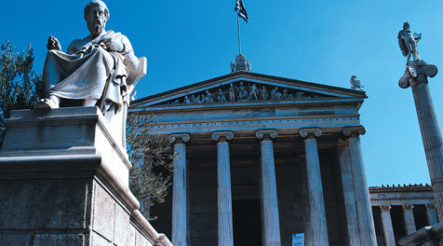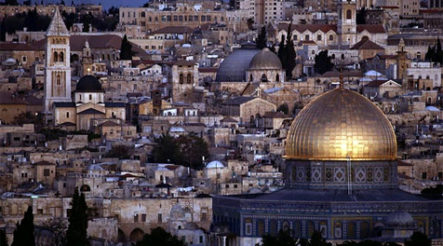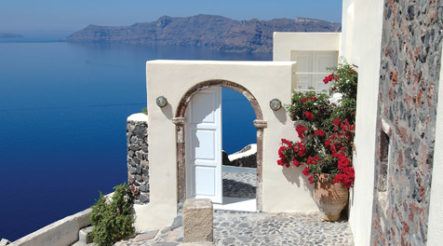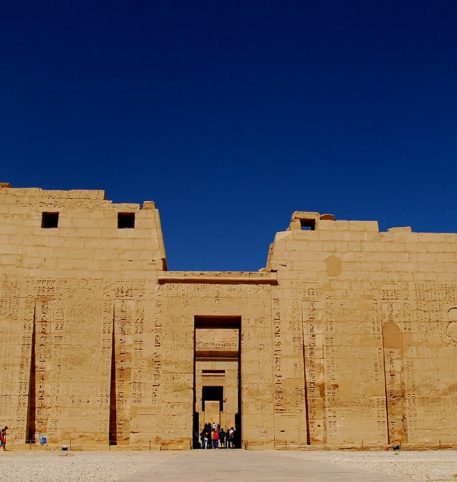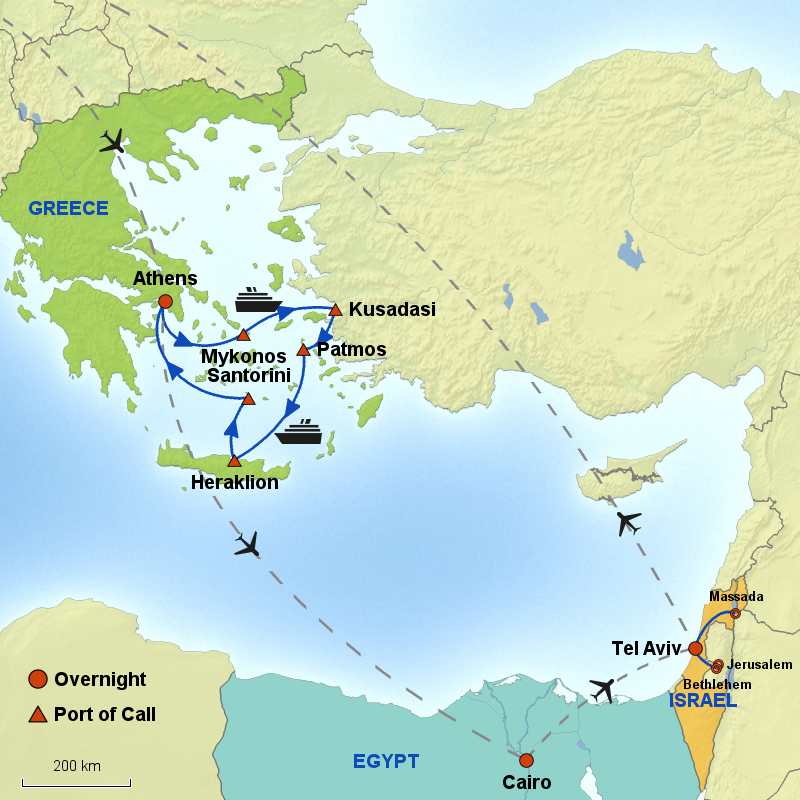GREECE

PASSPORT/VISA: (It is recommended that your passport have at least six months of validity whenever you travel abroad to avoid unintended travel disruptions. Because rules and regulations frequently change, please inquire about passports validity and visas from the consulate of the foreign country you will visit. Participants with valid U.S. and Canadian passports do not require visas. If you hold a passport of a foreign country, please contact the Greek Consulate in your area for information on whether or not you need a visa.
Important: Passengers requiring a Schengen Visa must have a multi-entry Schengen Visa if visiting more than one country.)
CLIMATE: (The temperature in Athens ranges from 55F in January to 92F in July and August. Seasonal breezes called meltemia moderate the summer heat. The country averages more than 3,000 hours of sunshine a year.)
CLOTHING: (Dress tends to be casual, but there are limits. Sleeveless dresses and shorts may not be worn in monasteries and churches, and women should be sure that arms and shoulders are covered. Jackets for men and cocktail dresses for women are required in the posher of restaurants and in the casinos.)
EXCURSIONS: (Visiting the Greek ruins often means traversing over irregular stony terrain that can present a double hazard. Thus, shoes worn on such excursions should be sturdy and absolutely comfortable. Do not wear high heel shoes on these excursions.)
CURRENCY: (The unit of currency is the Euro. Coinage is available in denominations of 1, 2, 5, 10, 20 and 50 cents with 1 and 2 Euros. Bank notes come in units of 5, 10, 20, 50, 100, 200 and 500 Euros. It is not necessary to exchange your money prior to your arrival in Athens.
There are two banks open where you can exchange your money at the baggage claim area in Athens airport. There are also banks at the hotels.)
TIPPING: (The Greek restaurants automatically include a 15% service charge. If that is the case, the custom is to leave small change on the plate for the waiter and an equivalent amount on the table for the bus boy. In restaurants without a service charge or in the case of room service, 15% is the norm.)
SHOPPING: (The favorite buys in Athens are furs, leather goods (especially shoes), hand-woven and hand-embroidered clothing and linen, ceramics, handbags, jewelry and flokati rugs. The most elegant shopping area is the Kolonaki district where you will find the latest European styles.)
ELECTRICITY: (The standard electrical current throughout Greece is 220AC and the outlets are made for 2 round poles.)
BANKS & CREDIT CARDS: (All major credit cards are accepted in hotels, restaurants and cosmopolitan boutiques. However, they are not used as extensively as they are in the U.S. Traveler's checks are widely accepted throughout Greece. They can be exchanged easily at almost all banks and post offices.)
TIME: (There is a seven-hour (+7) difference when New York is on the Eastern Standard Time. Greece, along with the rest of the European Community, observes daylight savings time from April to October.)
ISRAEL

PASSPORT/VISA: (It is recommended that your passport have at least six (6) months of validity whenever you travel abroad to avoid unintended travel disruptions. Because rules and regulations frequently change, please inquire about passports validity and visas from the consulate of the foreign country you will visit. Participants with valid U.S. passport do not require visas. If you hold a passport of a foreign country, please contact the Israeli Consulate in your area for information on whether or not you need a visa. Important: Passengers requiring a Schengen Visa must have a multi-entry Schengen Visa if visiting more than one country.)
CLIMATE: (Not only does Israel boost warm, pleasant weather from Spring throughout Autumn, but this period is totally rainless. Rain falls only during the winter months, particularly from December through February. The average temperature in Jerusalem from June to September is 72F, and 63F in May and October.)
CLOTHING: (Israel is an especially informal country. A formal affair calls for no more than a dark suit for men and the corresponding equivalent for women. During the day, particularly for touring, comfort is the guiding rule and cottons are coolest. Modest attire is required for visits to religious sites.)
CURRENCY & CREDIT CARDS: (The currencies of most Western countries are recognized in Israel as legal tender. Therefore, one can make purchases in one's own currency, with change made in Israeli Shekel. Travelers checks may be used and major international credit card are also accepted.)
SHOPPING HOURS: (Most shops are open daily, Sunday through Friday, and closed for the Jewish Sabbath on Saturday (Christian owned shops close on Sunday and Moslem owned shops on Friday). Some shops close between 1pm-4pm.)
TIPPING: (A 10% tip in a restaurant is considered correct. No tip is required for taxi drivers. It is convenience to tip one's tour guide and coach driver at the end of the tour, as well as hotel chamber maids, waiters, etc.)
TURKEY

PASSPORT/VISA: (It is recommended that your passport have at least six (6) months of validity whenever you travel abroad to avoid unintended travel disruptions. Because rules and regulations frequently change, please inquire about passports validity and visas from the consulate of the foreign country you will visit. Participants with a valid U.S. passport must also obtain a visa from the Turkish Consulate. If you hold a passport of a foreign country, please contact the Turkish Consulate in your area for information on whether or not you need a visa. Important:Passengers requiring a Schengen Visa must have a multi-entry Schengen Visa if visiting more than one country.)
CURRENCY: (The unit of currency is the Turkish Lira (TL). Coinage is available in denominations of 1, 5, 10, 25 and 50 Kurus with 1 Lira. Bank notes come in units of 1, 5, 10, 20, 50, and 100 New Lira. It is best to consult your bank or newspaper for the current exchange rate before you leave the country. In Turkey, banks offer more favorable exchange rates than hotels.
Travelers checks and major U.S. credit cards are widely accepted in major cities and resort areas. Sometimes payment in U.S. dollars can help you in bargaining for a special price.
Banks are open weekdays from 8:30am to noon and from 1:30pm to 5:00pm. Branches are major cities offer additional hours.)
TIME: (Turkey standard time is 2 hours ahead of GMT, 1 hour ahead of mid-European time and 7 hours ahead of Eastern Standard time.)
ELECTRICAL CURRENT: (The electrical current in Turkey is 200 volts AC in all parts of the country. Most major hotels in the main cities have adapters and converters available for guest use.)
WHAT TO PACK: (The dress code in Turkey is informal. Men will find that a jacket and tie may be appropriate for top restaurants and hotel dining rooms. While on tour and when visiting holy places of different faiths, dress should be conservative (no shorts or sleeveless shirts for men and women). The general rule is: the smaller the town, the more casual and conservative the dress.)
SHOPPING: (Shopping is great in Turkey especially at the bazaars. The best buys in Turkey are leather and suede, copper, brassware, porcelains, jewelry, embroideries and the famed Turkish carpets. Remember to bargain that's part of the pleasure!)
SHOPPING HOURS: (Shops are generally open from 9am to 1pm and from 2pm to 7pm Monday through Saturday. Shops are closed on Sundays. However, in resort areas, shops are open daily until 9pm and on Sundays.)
TIPPING: (Service charges are included but it is customary to show appreciation to hotel personnel and to your guide and driver. Service charges are included but it is customary to show appreciation to hotel personnel and to your guide and driver.)
